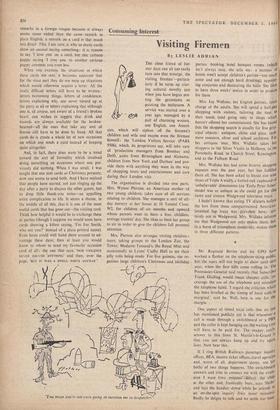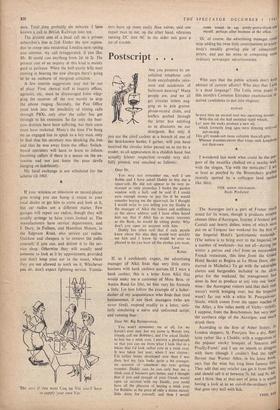Consuming Interest
Visiting Firemen
By LESLIE ADRIAN The organisation is divided into two parts. Mrs. Wynne Pierson, an American mother of two young children, takes care of all services relating to children. She manages a sort of all, day nursery at. her house at 10 Tenniel Close. W2, for -children . of six months and upward whose. parents want to have a free, childless, average tourists' day. She likes to limit her group to six in order to give the children full personal attention.
Mrs. Pierson also arranges visiting children s tours, taking groups to the London Zoo, the Tower, Madame Tussaud's, the Royal Mint and occasionally to Lyons' Cadby Hall to see their jelly rolls being made. For five guineas, she or- ganises large children's Christmas and. birthday parties. booking hotel banquet rooms (which isn't always easy, she tells me: a number of hotels won't accept children's parties—too inuch noise and not enough hard drinking), appoint' ing conjurors and decorating the halls. She likes to have three weeks' notice in order to prepare for them.
Mrs. Joy Widlake, her English partner, takes charge of the adults. She will spend a half-daY shopping with visitors, tailoring the tour, to their needs (and going only to shops which haven't offered her commissions). She has found that the shopping search is usually for five prin. cipal objects: antiques, china and glass, cash' mere sweaters, silver and school uniforms. For het antiques tour, Mrs. Widlake takes her shoppers to the Silver Vaults in Holborn, to the Portobello Road. to Church Street.. Kensington. and to the Fulham Road Mrs. Widlake has had some bizarre shopprng requests over the past year, but has ,fulfilled them all. She has been asked to locate size nine shoes of Triple A width, a fumed-oak cupboard of 'unbelievable' dimensions (an 'Early Peter Jones model was as antique as she could get for this item) and sixteen Wedgwood television -trays.
I hadn't known that eating TV dinners before the box from those compartmented American' invented lap trays was prevalent here: ea' tainly not in Wedgwood. Mrs. Widlake inforni5 me that Wedgwood not only makes them. bur' in a burst of triumphant modernity, makes 'heal in three different patterns Mr. Reginald Bevins and his GPO have worked a flanker on the telephone-using public. but the scars will not begin tO show until nest year, when the first bills come rolling in. 1 he Postmaster-General said recently. that Subscriber Trunk Dialling would mean. cheaper calls. el' courage the use of the telephone and stimulate the telephone .habit. 'I regard the, criticism which has been levelled at the timing of local calls as marginal.' said he. Well, here is one for the margin.
One aspect of timed. local calls that no One has mentioned publicly yet is that whenever. a call is made through a switchboard or a PI3% and the caller is kept hanging on, the waiting Lillie will have to be paid for. The, snappy catch' answer to this from St. Martin's-le-Grand is that you can always hang up and try agaia later. Now hear this.
If I ring British Railways passenger inquirY offices, BEA, theatre ticket offices, travel agencies and, worst of all, department stores, one Wr both) of two things happens. The switchboard answers and tries to connect me with the extol' sion I want (two minutes' delay); the chaP. at the other 'end, frantically busy, says 'Hello and lays the handset down while he attends t° an on-the-spot inquiry (two more' minutes); finally he deigns to talk and we settle our busi'
ness. Total time probably six minutes. I have known a call to British Railways take ten
The present cost of a local call on a private subscriber's line is 23d. Under the new regime. due to creep into residential London next spring and summer, my call (exaggerated, if you like, Mr B) could cost anything from 2d. to 2s. The present cost of an inquiry of this kind is mainly paid in patience When the half-yearly bills start coming in bearing the new charges there's going to be an outburst of marginal criticism.
A few interim suggestions may not be out of place First, clerical staff at inquiry offices, agencies, etc., must be discouraged from whip- ping the receiver oil the rest merely to stop the phone ringing Secondly, the Post Office must look into the possibility of timing calls through PBXs only after the caller has got through to his extension. So far only the busi- .ness districts have been suffering, but their costs must have rocketed. Many's the time I've hung on an engaged line to speak to a key man, only to find that his secretary was blocking the line and that he was away from the office. Switch- board operators will have to learn to inform .incoming callers if there is a queue on the ex- tension and not just leave the poor devils hanging on indefinitely.
My local exchange is not scheduled for the Scheme till 1963.
If your wireless or television or record-player goes wrong you can hump it round to your local dealer or get him to come and look at it, but car radios are a different matter. Few garages will repair car radios, though they will usually arrange to have yours,looked at. The manufacturers have service departments, and J. Davy, in Fulham, and Hamilton Motors, in the Edgware Road, also service car radios. Quickest and cheapest is to remove the radio yourself, if you can, and deliver it to the ser- vice shop. Otherwise they will usually send someone to look at it by appointment, provided you don't keep your car in the street, where they are not allowed to work on it. Whichever you do, don't expect lightning service. Transis- 'She says if ybu want Coq au Vin have
to supply your own Vitt.' tors burn up more easily than valves, said one repair man to me: on the other hand, vibrators turning DC into AC in the older sets gave a lot of trouble







































 Previous page
Previous page